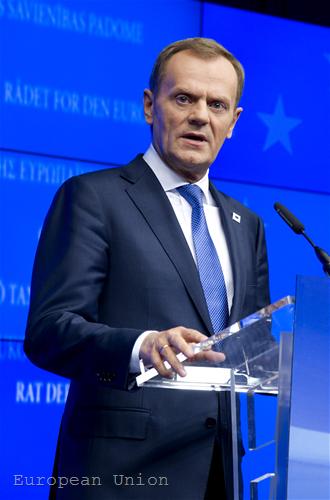Slovakia Rejected the EFSF Changes, the Government Collapsed
Ralitsa Kovacheva, October 12, 2011
 After long hours of debates and a midnight vote, Slovakia's parliament has rejected the plans for expansion of the eurozone rescue fund - the European Financial Stability Facility (EFSF). After the Freedom and Solidarity party, the second largest partner in the ruling centre-right coalition refused to support the decision, the government collapsed.
After long hours of debates and a midnight vote, Slovakia's parliament has rejected the plans for expansion of the eurozone rescue fund - the European Financial Stability Facility (EFSF). After the Freedom and Solidarity party, the second largest partner in the ruling centre-right coalition refused to support the decision, the government collapsed.
Two months ago the party leader and speaker of the Slovak Parliament, Richard  Sulik, warned he would do everything possible to prevent the proposal from being adopted by Parliament. He said the decision to take debts of troubled countries would make the EU a "debt union" and it was "a straight road to complete socialism". "I’d rather be a pariah in Brussels than have to feel ashamed before my children, who would be deeper in debt should I back raising the volume of funding in the EFSF bail-out mechanism," Mr Sulik told Parliament yesterday, quoted by The Financial Times.
Sulik, warned he would do everything possible to prevent the proposal from being adopted by Parliament. He said the decision to take debts of troubled countries would make the EU a "debt union" and it was "a straight road to complete socialism". "I’d rather be a pariah in Brussels than have to feel ashamed before my children, who would be deeper in debt should I back raising the volume of funding in the EFSF bail-out mechanism," Mr Sulik told Parliament yesterday, quoted by The Financial Times.
However, it is expected that this decision of the Slovak parliament will not be final. Three of the four parties in the ruling coalition have supported the changes, and probably the opposition Social Democratic Party of Robert Fico is willing to do so. Most likely, by the end of the week there will be a new voting and the EFSF changes will still be adopted. This indicates that the purpose of the negative vote was rather to push down the government and shows the extent to which European decisions become hostages to national political intrigues.
 Slovakia was the last country in the euro area which had to ratify the decisions of the eurozone leaders from 21 July, after these had already been approved by all other countries. This is not the first time Bratislava is putting at risk the common efforts to address the crisis - last year it refused to join the Greek bailout, arguing that it was poor enough to be able to afford paying for others. The Financial Times notes that, while the Irish and Portuguese enjoy the sympathy of the Slovaks, the people in Slovakia see Greece as the cause of all the problems. The newspaper writes that during the debates yesterday, Prime Minister Iveta Radicova told lawmakers she had been contacted by Portuguese Prime Minister Pedro Passos Coelho, who told her that the deadlock in Bratislava was "giving him a heart attack".
Slovakia was the last country in the euro area which had to ratify the decisions of the eurozone leaders from 21 July, after these had already been approved by all other countries. This is not the first time Bratislava is putting at risk the common efforts to address the crisis - last year it refused to join the Greek bailout, arguing that it was poor enough to be able to afford paying for others. The Financial Times notes that, while the Irish and Portuguese enjoy the sympathy of the Slovaks, the people in Slovakia see Greece as the cause of all the problems. The newspaper writes that during the debates yesterday, Prime Minister Iveta Radicova told lawmakers she had been contacted by Portuguese Prime Minister Pedro Passos Coelho, who told her that the deadlock in Bratislava was "giving him a heart attack".
Meanwhile, the Troika mission (the European Commission, the ECB and the IMF) has completed the fifth review of the Greek economic programme. Despite poor performance and unfavourable forecasts, the Commission statement gives a clear signal that the next tranche of the Greek loan, worth 8 billion euros, will probably be released in early November. For this purpose, the conclusions of the experts must be approved by the Eurogroup and the IMF.
According to the evaluation of the Troika mission, the recession in Greece will be deeper than expected and the recovery will start only from 2013 onwards. "There is no evidence yet of improvement in investor sentiment and the related increase in investments, in part because the reform momentum has not gained the critical mass necessary to begin transforming the investment climate."
Although it has achieved a major reduction of the deficit, compared with the beginning of the programme, the Greek government will fail to meet the fiscal targets for 2011. "To ensure a further reduction in the deficit in a socially acceptable manner and to set the stage for a recovery to take hold, it is essential that the authorities put more emphasis on structural reforms in the public sector and the economy more broadly." Revenues in 2011 will be significantly lower than expected due to delays in privatisation and worse market conditions. The experts stress that the key condition for the success of privatisation is to ensure the independence of the privatisation fund from political pressure. In 2013-2014 additional measures will be needed, focused on the expenditure side.
"A reinvigoration of reforms remains the overarching challenge facing the authorities. In this regard, the decision to suspend the mandatory extension of sector-level collective agreements to the firm level is a major step forward, as it will help ensure the flexibility in the labour market needed to boost growth and prevent high unemployment from getting entrenched."
The statement makes the important clarification that "the success of the programme continues to depend on mobilising adequate financing from private sector involvement (PSI) and the official sector." At the eurozone leaders meeting on 21 July it has been decided the private sector to support Greece on a voluntary basis with different measures totalling 37 billion euros by 2014. The expected average loss for Greek debt holders was estimated at 21 percent. Currently, however, it is being discussed the private sector losses to reach 60 percent of the value of Greek bonds.
As to the public sector financing, big expectations are assigned to the expansion of the rescue fund EFSF, which is the main tool to tackle the crisis. Ratification of the changes, however, has been delayed for too long and in the case of Slovakia it is facing a serious risk. Meanwhile, the debt crisis has begun to shake the banking system and Europe now urgently needs to decide no longer whether, but how to recapitalise its banks. ECB President Jean-Claude Trichet warned that the crisis has already become systemic and decisive measures were required.
These have already been promised by German chancellor Angela Merkel and  French President Nicolas Sarkozy after their meeting on 9 October. Their proposals are expected to be discussed and possibly approved by the EU leaders at the European Council on 23 October. It was postponed by one week of the initial dates 17 and 18 October, precisely to allow more time to prepare a comprehensive plan to tackle the crisis.
French President Nicolas Sarkozy after their meeting on 9 October. Their proposals are expected to be discussed and possibly approved by the EU leaders at the European Council on 23 October. It was postponed by one week of the initial dates 17 and 18 October, precisely to allow more time to prepare a comprehensive plan to tackle the crisis.
 | © The Council of the European Union
| © The Council of the European Union | © The Council of the European Union
| © The Council of the European Union | © European Union
| © European Union Klaus Regling | © Council of the EU
Klaus Regling | © Council of the EU Mario Centeno | © Council of the EU
Mario Centeno | © Council of the EU Mario Centeno | © Council of the EU
Mario Centeno | © Council of the EU